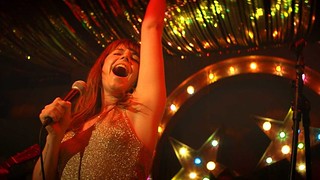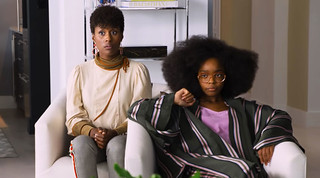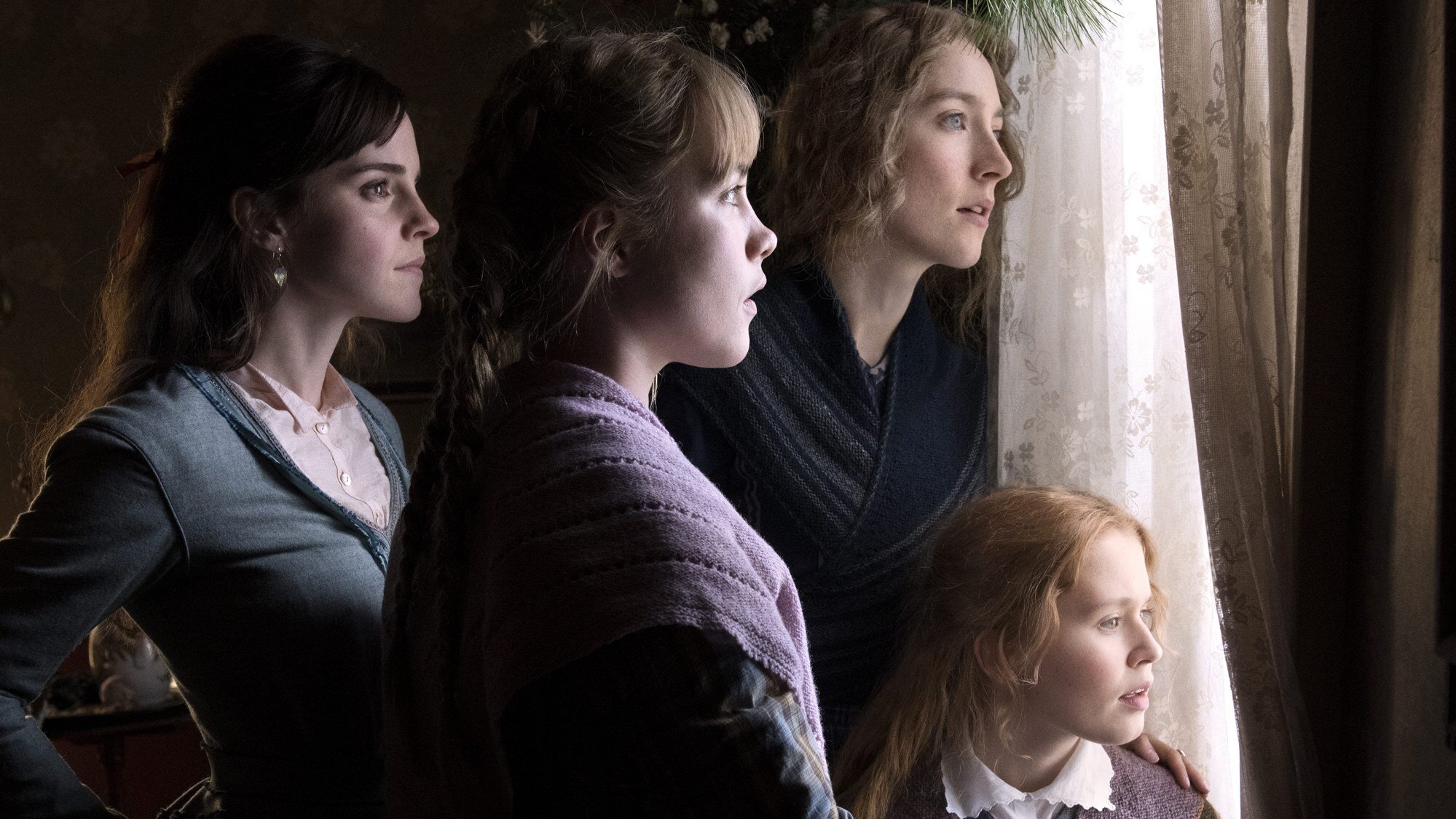(And the nominees are...)
Okay, let's just get this out of the way:
Joker leads the pack with 11 nominations, which basically makes one of the year's biggest piles of garbage a huge Oscar front-runner. Should I finally lose all faith in humanity? Nah, maybe not. I mean, in
Joker's defense, it's a gorgeously shot, beautifully scored, impeccably acted pile of garbage. That said, three other movies came quite close to tying that number, with ten nominations each:
The Irishman,
1917, and
Once Upon a Time ... In Hollywood. Each of the are more deserving of every award than
Joker, though by varying margins. But, that's not a very high bar either. Academy voters sure do know how to set that bar low. Anyway, let's get on with it!
Actor in a Leading Role
Antonio Banderas,
Pain and Glory
Leonardo DiCaprio,
Once Upon a Time ...In Hollywood
Adam Driver,
Marriage Story
Joaquin Phoenix,
Joker
Jonathan Pryce,
The Two Popes
WHO I THINK WILL WIN: Ugh. This feels like a bad omen, starting with the first award almost guaranteed to go to
Joker. Adam Driver was the front runner for some time, but at the moment Joaquin Phoenix seems all but guaranteed to win.
WHO I THINK SHOULD WIN: You know what? I'm not sure I made this decision until this very moment. This is the first time Antonio Banderas has ever been nominated, amazingly, and he actually did Oscar-worthy work in
Pain and Glory. I'd be happy to see Adam Driver win too, but if I were voting, and I were voting today, my vote would go to Antonio Banderas.
WHO I THINK SHOULD
NOT WIN: I really hate that I am saying this, because I prefer to say
Joker doesn't deserve any Oscars for any reason, but even though I enjoyed
The Two Popes and Jonathan Pryce is great, I'd still say he's the least deserving out of this group.
Actress in a Leading Role
Cynthia Erivo,
Harriet
Scarlett Johansson,
Marriage Story
Saoirse Ronan,
Little Women
Charlize Theron,
Bombshell
Renée Zellweger,
Judy
WHO I THINK WILL WIN: Renée Zellweger has all but won this award already, judging by the predictions of everyone and their mother for the past four months. Given that she already has an Oscar, and
Judy was merely good and not great, I would be delighted if an upset happened and any of the other women in this category won.
WHO I THINK SHOULD WIN: To be fair, I actually think Zellweger winning would be absolutely fair. Upon further reflection, though, I think I vote for Saoirse Ronan, who has been a stunning performer since as far back as
Atonement in 2007—four nominations ago!
WHO I THINK SHOULD
NOT WIN: I honestly don't think either Cynthia Erivo
or Scarlett Johansson deserve this award, at least not for these roles. Even though they are both fantastic actors, and Erivo is in the truly unfortunate position of being the "token black" among the acting nominees this year. Or even more accurately, "token nonwhite." I would have preferred to see Awkwafina nominated for
The Farewell, a movie which inexplicably got no nominations at all.
Actor in a Supporting Role
Tom Hanks,
A Beautiful Day in the Neighborhood
Anthony Hopkins,
The Two Popes
Al Pacino,
The Irishman
Joe Pesci,
The Irishman
Brad Pitt,
Once Upon a Time ...In Hollywood
WHO I THINK WILL WIN: If Brad Pitt does not win this award, it will be the biggest Oscar upset of the night.
WHO I THINK SHOULD WIN: I'm pulling for Tom Hanks, here with his first Oscar nomination in nineteen years, which is extraordinary. But, this is the sole nomination given to
A Beautiful Day in the Neighborhood, which does not bode well for it.
WHO I THINK SHOULD
NOT WIN: Al Pacino in
The Irishman? Come on. That movie is decent but wildly overrated, and Al Pacino's is the most blustery performance in it.
Actress in a Supporting Role
Kathy Bates,
Richard Jewell
Laura Dern,
Marriage Story
Scarlett Johansson,
Jojo Rabbit
Florence Pugh,
Little Women
Margot Robbie,
Bombshell
WHO I THINK WILL WIN: If all the prognosticators are to be believed, Laura Dern is a lock. Which honestly makes little sense to me; she's a great actor but she's hardly doing her best work in this particular part.
WHO I THINK SHOULD WIN: Among this group, I think perhaps Margot Robbie gave the best—and certainly the most nuanced—performance.
WHO I THINK SHOULD
NOT WIN: I love Kathy Bates. And I haven't even seen
Richard Jewell. But, I know enough about it to know this nomination—the only one given to this film—was not necessary, nor did Bates need it.
Cinematography
The Irishman, Rodrigo Prieto
Joker, Lawrence Sher
The Lighthouse, Jarin Blaschke
1917, Roger Deakins
Once Upon a Time ...In Hollywood, Robert Richardson
WHO I THINK WILL WIN: This one seems a lock for
1917, although I can also see
Once Upon a Time ...In Hollywood pulling through here.
WHO I THINK SHOULD WIN:
1917 is indeed the obvious choice; the camera work in that movie is legitimately amazing.
WHO I THINK SHOULD
NOT WIN: I'm sorry, but the cinematography in
The Irishman was just nothing special. Even in
The Joker, the cinematography was one of the few things actually worthy of high compliment.
Production Design
The Irishman
Jojo Rabbit
1917
Once Upon a Time ...In Hollywood
Parasite
WHO I THINK WILL WIN: I would bet money that
Once Upon a Time ...In Hollywood will win this one. The cinematography actually is great, plus Hollywood loves movies about itself, especially nostalgic ones.
WHO I THINK SHOULD WIN: It's too well integrated to be noticeable, but the production design iin
1917 is actually by far the most impressive thing about it, once you really think on it.
WHO I THINK SHOULD
NOT WIN:
Jojo Rabbit? Really? That movie will not win this award, nor should it.
Costume Design
The Irishman, Sandy Powell and Christopher Peterson
Jojo Rabbit, Mayes C. Rubeo
Joker, Mark Bridges
Little Women, Jacqueline Durran
Once Upon a Time ...In Hollywood, Arianne Phillips
WHO I THINK WILL WIN: This category is often used to throw a bone to period films, so I'm betting on
Little Women.
WHO I THINK SHOULD WIN:
Little Women also actually deserves it.
WHO I THINK SHOULD
NOT WIN: The only reason
Joker even got this nomination is because an inexplicably huge number of people are jizzing themselves over that garbage dump of a movie. There are some elements that really are impressive about it, which makes it even more annoying, but this is absolutely not one of them. Are we supposed to cheer because the guy was dressed in a red and orange suit?
Directing
Martin Scorsese,
The Irishman
Todd Phillips,
Joker
Sam Mendes,
1917
Quentin Tarantino,
Once Upon a Time ...In Hollywood
Bong Joon Ho,
Parasite
WHO I THINK WILL WIN: This one is a tough call. The real answer is "I have no idea." Gun to my head, I would say Sam Mendes for
1917. If that happens, I'll bet anything this will be yet another year in which Best Director and Best Picture are split—and
Joker wins Best Picture. I'll just have to keep my barf bucket handy.
WHO I THINK SHOULD WIN: Sam Mendes, actually! I would also be happy with Bong Joon Ho, although his movie was wildly over-hyped and that did it no favors. With
1917, though, I was duly impressed even with that movie's own large amount of critical praise.
WHO I THINK SHOULD
NOT WIN: Listen, everyone.
The Irishman just isn't the "great film" cinephiles seem to think it is.
Film Editing
Ford v. Ferrari, Michael McCusker and Andew Buckland
The Irishman, Thelma Schoonmaker
Jojo Rabbit, Tom Eagles
Joker, Jeff Groth
Parasite, Yang Jinmo
WHO I THINK WILL WIN: Given the subject matter and how incredibly well put-together its racing sequences are, I'm actually going to predict that this will be the only Oscar
Ford v. Ferrari wins.
WHO I THINK SHOULD WIN: I'd be happy with
Ford v. Ferrari, but thanks to its intricate plotting,
Parasite is arguably more deserving.
WHO I THINK SHOULD
NOT WIN: Again with
The Irishman! I get that its massive length is part of the point; its ending would not be as effective without all the time spent on what leads up to it. The same effect could still have been achieved by cutting this movie
down to three hours. Why would we give the editing award to the guy who refused to edit?
Makeup and Hairstyling
Bombshell
Joker
Judy
Maleficent: Mistress of Evil
1917
WHO I THINK WILL WIN: I can pretty easily see
Joker winning this one, just because a lot of times Academy voters like to be on the nose.
WHO I THINK SHOULD WIN: I'm going with
Bombshell on this one, its actors—particularly Charlize Theron—were so impressively transformed.
WHO I THINK SHOULD
NOT WIN:
Joker can shove a bundle of makeup brushes right up its own ass.
Music (Original Score)
Joker, Hildur Guðnadóttir
Little Women, Alexandre Desplat
Marriage Story, Randy Newman
1917, Thomas Newman
Star Wars: The Rise of Skywalker, John Williams
WHO I THINK WILL WIN: I really can't answer this one with any authority whatsoever either, but I'm still going to guess
1917.
WHO I THINK SHOULD WIN: You know what? I don't really give a shit.
WHO I THINK SHOULD
NOT WIN: Well, except that of course I really don't want
Joker to win this one either.
Music (Original Song)
"
I Can't Let You Throw Yourself Away," from
Toy Story 4, Music and Lyric by Randy Newman
"
(I'm Gonna) Love Me Again," from
Rocket Man, Music by Elton John, Lyric by Bernie Taupin
"
I'm Standing With You," from
Breakthrougj, Music and Lyric by Diane Warren
"
Into the Unknown," from
Frozen II, Music and Lyric by Kristen Anderson-Lopez and Robert Lopez
"
Stand Up," from
Harriet, Music and Lyric by Joshuah Brian Campbell and Cynthia Erivo
WHO I THINK WILL WIN: I think this will be
Rocketman's one Oscar win. (It's also its one nomination.)
WHO I THINK SHOULD WIN: If there were any justice in the world—and as we all know, particularly in the world of the Acadeny, there often is not—then Cynthia Erivo, while not deserving of the acting award in this case, would at least be rewarded for her truly incredible voice.
WHO I THINK SHOULD
NOT WIN: The trailer alone revealed
Breakthrough to be a bunch of religious claptrap best avoided. It will be cool to see
This Is Us's Chrissy Metz sing a song at the Academy Awards, but for this movie, that should be enough of an award.
Visual Effects
Avengers: Endgame
The Irishman
The Lion King
1917
Star Wars: The Rise of Skywalker
WHO I THINK WILL WIN: It won't be at all justified, but I think this will go to
Avengers: Endgame, not because it actually has the best effects, but because it was a massive box office smash, and it's the only award it's even eligible for. And voters will likely vote for the movie with the
most visual effects, as opposed to the best.
WHO I THINK SHOULD WIN: This is also the only award nomination for
The Lion King—which did not even get the widely expected Original Song nod—but, that's still the movie that deserves the win. None of the other movies come even close to how visually amazing this film is.
WHO I THINK SHOULD
NOT WIN:
Avengers: Endgame is only here as a consolation prize in this year's popularity contest, and because of how noisy and packed with effects it is. That hardly makes it the best.
Writing (Adapted Screenplay)
The Irishman, Screenplay by Steven Zaillian
Jojo Rabbit, Screenplay by Taika Waititi
Joker, Written by Todd Phillips & Scott Silveri
Little Women, Written for the screen by Greta Gerwig
The Two Popes, Written by Anthony McCarten
WHO I THINK WILL WIN: The current odds are apparently the same for both
The Irishman and
Little Women as the front runner in this category. I don't think
The Irishman will actually win many of the 10 awards for it was nominated, but I think it likely has the edge here. Unfortunately,
Little Women just isn't getting the respect it deserves, so I don't even trust it being regarded as a front runner. But, I'd love to be proven wrong.
WHO I THINK SHOULD WIN: Honestly, I'm realizing at this very moment that among these five films, I think
The Two Popes actually has the best-written dialogue.
WHO I THINK SHOULD
NOT WIN:
Joker is less deserving of this award in particular than any of those it was nominated for. Did a bunch of people's hands slip and nominate this film by accident? Its script is by far
Joker's biggest problem—big enough to make the movie irredeemable. A well-shot and well-acted piece of shit is still a piece of shit. Watching
Joker is the metaphorical equivalent of looking at a turd in HD.
Writing (Original Screenplay)
Knives Out, Written by Rian Johnson
Marriage Story, Written by Noah Baumbach
1917, Written by Sam Mendes & Krysty Wilson-Cairns
Once Upon a Time ...In Hollywood, Written by Quentin Tarantino
Parasite, Screenplay by Bong Joon Ho, Han Jin Won; Story by Bong Joon Ho
WHO I THINK WILL WIN:
Once Upon a Time ...In Hollywood, even though it doesn't deserve it. But, this is where Tarantino has gotten his previous two Oscar wins as well as half his ttotal Oscar nominations, and this is by far his most-nominated film to date. If he wins any Oscar this year—and he is likely to win multiple—then it will be this one.
WHO I THINK SHOULD WIN: It'll never happen, but I would be ecstatic if
Knives Out won this award. I'd also be really happy with
Parasite.
WHO I THINK SHOULD
NOT WIN: Ironically, I actually think
Once Upon a Time ...In Hollywood is the least deserving of these five films. People love that movie so much they somehow overlook the many flaws in its script.
Animated Feature Film
How to Train Your Dragon: The Hidden World
I Lost My Body
Klaus
Missing Link
Toy Story 4
WHO I THINK WILL WIN: Well, this is new. I've only seen one of these films! I still think Pixar will prevail and
Toy Story 4 will win.
WHO I THINK SHOULD WIN: I really couldn't say.
WHO I THINK SHOULD
NOT WIN: I couldn't really say here either, although
Missing Link looked pretty dumb.
International Feature
Corpus Christi, Directed by Jan Komasa (Poland)
Honeyland, Directed by Ljubo Stefanov and Tamara Kotevksa (North Macedonia)
Le Misérables, Directed by Ladj Ly (France)
Pain and Glory, Directed by Pedro Almodóvar (Spain)
Parasite, Directed by Bong Joon Ho (South Korea)
WHO I THINK WILL WIN: You'd have to be a corpse not to know that
Parasite will win this award.
WHO I THINK SHOULD WIN:
Honeyland was the best movie I saw all year, but I don't see the sense in awarding it for both the categories in which it was nominated. Here, I would also go for
Parasite. Bong Joon Ho deserves a win.
WHO I THINK SHOULD
NOT WIN: I can't answer this for this category either, as I only saw three of the films, and all three of them were either very good or phenomenal.
Documentary Feature
American Factory, Steven Bognar, Julia Reichert and Jeff Reichert
The Cave, Feras Fayyad, Kirstine Barfod and Sigrid Dyekjær
The Edge of Democracy, Petra Costa, Joanna Natasegara, Shane Boris and Tiago Pavan
For Sama, Waad al-Kateab and Edward Watts
Honeyland, Ljubo Stefanov, Tamara Kotevska and Atanas Georgiev
WHO I THINK WILL WIN: I haven't seen it (and I really should; it's now streaming on Netflix), but I still know the buzz is all about
American Factory, and by a stunningly wide margin.
WHO I THINK SHOULD WIN: If Academy voters did their jobs (and I am not an Academy member, so I have more of an excuse for not having seen
quite all of these movies!), they would watch every screener available to them—and if they had any sense, they would vote for
Honeyland.
WHO I THINK SHOULD
NOT WIN: Any movie that is not
Honeyland. In this case I don't care that I haven't seen any of the other nominees! In fact I usually omit this category for this very reason, but with
Honeyland being my favorite movie of the year, I had to include it.
Best motion picture of the year
Ford v. Ferrari
The Irishman
Jojo Rabbit
Joker
Little Women
Marriage Story
1917
Once Upon a Time ...In Hollywood
Parasite
WHO I THINK WILL WIN: All bets appear to be on
Once Upon a Time ...In Hollywood, an I see no reason not to make that my expectation as well. As long as
Joker doesn't win, I'll be satisfied—although the love for that movie is so irritating to me, I can still see a surprise win for it here. That's right, every voter is just thinking,
What will annoy Matthew the most?
WHO I THINK SHOULD WIN: Well, this is strange. Only two of these movies were on my top 10 for the year (
Little Women and
Ford v. Ferrari), so I guess I should choose one of those, huh? Except! I didn't even get a chance to see
1917 until last week, after I had written up my top 10—and it would have been on it had it been given the chance. So,
1917 is my choice.
WHO I THINK SHOULD
NOT WIN:
Joker.
Joker.
JOKER. Fuuuuck
Joker! How many times do I have to say it? Actually for a while there I thought I would be reserving this attitude for
Jojo Rabbit, which is overrated and problematic in its own unique ways, and it looked like it might ride a wave similar to last year's
Green Book. So much for that! I've got so much hate for
Joker that I've hardly got time to resent
Jojo Rabbit, which now seems unlikely to win any of these awards anyway. What tragic irony that I would rather see it win
anything than
Joker. That wrongminded movie made by a troupe of dipshits will now dominate this year's Oscar conversation, and I can't wait for that part to be over. Or at least, to revel in some of its inevitable defeats; it won't possibly win them all, and I'll take solace in that much, I guess.
(Nominations for documentary short, animated short, live action short, sound editing, and sound mixing were also announced, but I don't know enough about them to make any worthwhile observations.)
The 92nd Academy Awards telecast will air on ABC Sunday, February 9 at 5 p.m. Pacific Time.























